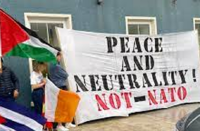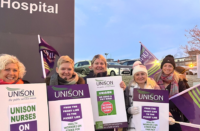The Charlie Donnelly Winter School returns to Dungannon on Saturday 11 March and will again be hosted by the Hill of the O’Neill and Ranfurly House. The centre will play host to a series of presentations and discussions on the ideals and legacy of the Dungannon-born revolutionary socialist poet who died during the Battle of Jarama in 1937.
Admission is free, and booking is not required.
The well-known activist and campaigner for social justice and human rights Bernadette McAliskey will head an impressive line-up of speakers at this year’s winter school, which coincides with the 86th anniversary of Charlie Donnelly’s untimely death while fighting with the 15th International Brigade in the Spanish Anti-Fascist War, 1936–39.
The event co-ordinator, Gearóid Ó Machail from Benburb, outlined the theme of the 2023 winter school:
“The world is currently in an extremely precarious and dangerous place, with global tensions growing between the US, EU, NATO and the Russian Federation over the war in Ukraine and with the unwelcome rise of a nasty far-right element both here and abroad, who seek to spread hate and intolerance towards minorities in our communities.
“The toxic combination of extreme right-wing populism and increasing sabre-rattling, militarism and warmongering among competing geo-political forces has many echoes of the 1930s. Charlie Donnelly and his comrades in the International Brigades were acutely aware of the dangers to world peace posed by the overthrow of democracy in Spain at the hands of fascist forces under General Franco and his allies in Nazi Germany and Mussolini’s Italy.
Unfortunately, back then the reasonable voices calling for an end to fascism, militarism and imperialist warfare went unheeded as the world drifted into global confrontation, mass destruction, and unprecedented loss of human life.
“Our winter school in Dungannon will examine these themes and explore what options are open in the struggle to preserve our neutrality and promote peace.”
Gearóid and his colleagues from Friends of the International Brigades, Ireland, have just returned from Spain, where they participated in an extensive international programme of events commemorating Charlie Donnelly and his International Brigade comrades last weekend in the capital, Madrid, and in the towns and villages around Tarancón, Rivas-Vaciamadrid, and in the Jarama Valley.
Saturday’s programme in Dungannon will begin in the morning with the annual wreath-laying ceremony at the Charlie Donnelly Memorial in his home townland of Killybrackey, near Edendork. Wreaths and flowers from a variety of groups and individuals will be laid before a short oration and poetic tribute at the site.
Delegates will then travel to the Hill of the O’Neill for the first panel discussion, “Peace and neutrality in an age of militarism,” featuring Roger Cole, founder and chairperson of the Peace and Neutrality Alliance, and Dr Karen Devine, lecturer in European Union policies and politics, DCU. This discussion and subsequent presentations will be livestreamed on Facebook to an international audience.
After lunch in the Hill of the O’Neill Events Centre, Dr Bahman Azad, president of the United States Peace Council and retired professor of economics and sociology at Berkeley University, will join Rev. Dr Mark Gray, minister of Bannside Presbyterian Church, for a discussion on the theme “Imperialist rivalries and the threat to world peace.”
The keynote address at this year’s school will be given at 3 p.m. by the popular social justice activist Bernadette McAliskey, on the theme “The rise of fascism and the threat of the far right.” Bernadette’s presentation will be followed by a live Q&A.
A large audience is expected to attend the presentation, and delegates will be admitted on a first come first served basis.
Proceedings at the 2023 winter school will close with the laying of flowers and wreaths at the memorial to the International Brigader Ben Murray in Moybridge, near Aughnacloy.
Charles Donnelly was born in Killybrackey, near Dungannon, Co. Tyrone, on 10 July 1914. He enrolled in UCD in 1931, where he studied logic, English, history, and Irish. In university he began writing poetry and prose for student publications. He joined the Republican Congress in 1934, and twenty-year-old Donnelly was soon elected to the National Executive. Thereafter he wrote for the Congress newspaper on political and social questions. In February 1935 he left Ireland for London. There he worked for the London Branch of the Republican Congress. He also wrote articles for various left-wing publications.
In 1936, with the outbreak of the fascist coup in Spain, he joined the International Brigades. He reached Spain on 7 January 1937 and at Albacete joined an Irish contingent, led by Frank Ryan, known as the Connolly Column, who had come to Spain to fight on the government side. Donnelly and his comrades were attached to the American Abraham Lincoln Battalion.
On 15 February, after receiving only rudimentary military training, the Lincoln Battalion was thrown into the Battle of Jarama, near Madrid. Donnelly reached the front on 23 February, where he was promoted to the rank of field commander. On 27 February his unit was sent on a frontal assault on the nationalist positions on a hill named Pingarrón. Donnelly and his unit were pinned down by machine-gun fire all day. He was eventually caught in a burst of gunfire. He was struck three times, in the right arm, the right side and the head. He collapsed and died instantly.
His body lay on the Jarama battlefield until it was recovered by a fellow-brigader, Peter O’Connor, on 10 March. He was buried nearby in an unmarked grave with several of his comrades.
There are memorials to Donnelly in Dungannon, Dundalk, Jarama, Omeath, Rivas Vaciamadrid, and his alma mater, UCD.
■ The Charlie Donnelly Winter School, 2023, has received financial assistance and support from Comhairle Ceantair Lár Uladh / Mid-Ulster Council, Friends of the International Brigades, Ireland, and Betty Sinclair Branch, CPI.






